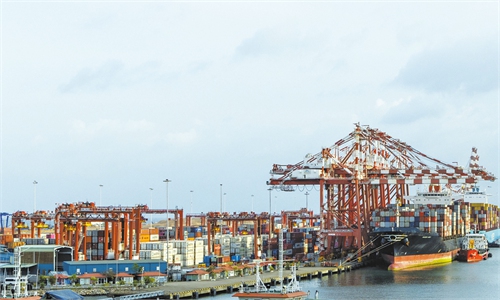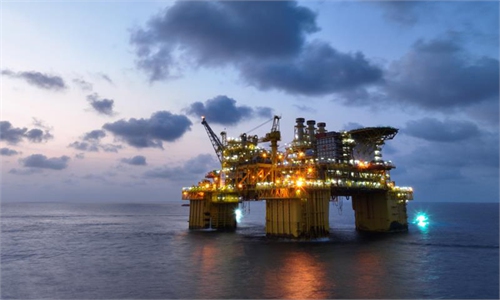
Screenshot of the FPSO Almirante Tamandare of the Buzios7 project of the Buzios oilfield in Brazil File photo: chinanews.com
The Buzios7 project of the Buzios oilfield in Brazil - the world's largest deepwater oil field, in which China National Offshore Oil Corp (CNOOC) has participated and holds an interest, was put into operation on Saturday local time. The project is an important milestone of the deepening pragmatic cooperation between China and Brazil, Chinanews.com reported on Sunday.The Buzios7 project is located in the Santos Basin in the southeastern offshore waters of Brazil with an operating depth of 2,000 meters, and it adopts a fully offshore development model featuring a floating production storage and offloading (FPSO) unit and subsea production system.
The FPSO boasts a crude oil production capacity of 225,000 barrels per day and a natural gas processing capacity of 12 million cubic meters per day.
The FPSO Almirante Tamandare, a key component of the project, stands as one of the world's largest FPSO units. It was built and commissioned domestically in China, showcasing the country's robust manufacturing capabilities and comprehensive supply chain.
The successful completion is a milestone that capitalizes on international collaboration opportunities and embodies the contribution of Chinese wisdom to global energy innovation rooted in Brazil's deepwater oil and gas development, per the report on Chinanews.com.
In addition to energy, China and Brazil have established close cooperation across various fields.
Chinese investments in Brazil primarily span sectors such as energy, mining, agriculture, infrastructure and manufacturing, according to China's Foreign Ministry. Brazilian investments in China focus on such projects as compressor manufacturing, coal, real estate, auto parts production, and textiles and apparel.
Chinese enterprises have also undertaken large-scale infrastructure projects in Brazil, such as coal-fired power plants, ultra-high-voltage transmission lines, natural gas pipelines and port dredging work, the Chinese Foreign Ministry said in November 2024.
In 2024, bilateral trade reached 1.34 trillion yuan ($184.73 billion), a year-on-year increase of 4.6 percent, while China's exports to Brazil recorded a 23.3 percent surge to 512.82 billion yuan, according to data from China's General Administration of Customs.
Global Times



